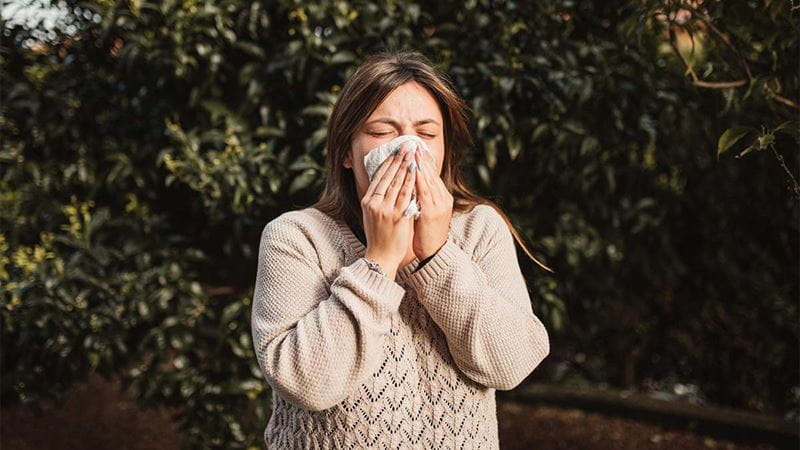Blog article
The link between asthma and hay fever is nothing to sneeze at

Depending on the allergen, hay fever symptoms (enter sneezing and watery eyes) can be experienced year-round. It's usually spring and summer when things can get sticky though, thanks to heightened hay fever triggers such as grass, weeds, and tree pollens.
During these times of year many managing asthma may also experience hay fever and may have to look at treating both. Let's have a look at hay fever and asthma, how they interact and where to get help to manage symptoms.
In this article
- Asthma and hay fever
- Tailoring your treatment
- Thunderstorm asthma
- Asthma management during hay fever season
- Support station
Asthma and hay fever
Asthma and hay fever are closely linked and most people with asthma experience hay fever too.2 Most of us already know whether spring is a time to stop and smell the roses, or stock up on the hankies. But how can this affect asthma?
Asthma is a chronic condition - affecting the airways in the lungs that become inflamed and narrowed when exposed to triggers. This means there's less space in the airways, and breathing is restricted. Asthma symptoms include:1
- Wheezing
- Breathlessness
- Chest tightness
While asthma affects the lungs, hay fever affects the nasal passage.3
Hay fever is an allergic reaction to particles (such as pollen, grasses, dust mites, mould or animal fur) breathed through the nose. In Australia, some people have hay fever symptoms show up when there are large amounts of grass pollen in the air. This usually happens in the springtime or summer (flowers and plants use pollen to… well… pollinate).3
Hay fever symptoms include:3
- Itchy nose and eyes
- Runny nose
- Sneezing
- A blocked nose
Because better management of hay fever has been shown to improve asthma control in both adults and children3, it's important to treat the allergies in your nose as well as the asthma in your lungs.2
What is hay fever, and why do we experience this in spring?
Tailoring your treatment
Doctors may recommend to keep on top of your hay fever symptoms with treatments like, antihistamines, corticosteroid sprays, and saline sprays.3
Looking into allergy testing might be recommended for you if your symptoms are persistent and can lead to a more targeted treatment plan.3
Allergen immunotherapy may be suggested for hay fever too, especially if your allergy testing shows pollen or dust mite allergy. Asthma Australia have made a helpful video to help you better understand this treatment.
It's important to have your treatment plan in place, especially if you are at risk of thunderstorm asthma.
Thunderstorm asthma
Having both asthma and hay fever also means you may be vulnerable to thunderstorm asthma4. Thunderstorm asthma can be very serious. This occurs when large clouds of grass pollens catch a ride on the air moved by thunderstorms.
In 2016, Victoria saw the largest thunderstorm asthma event recorded worldwide.4 Keeping up to date with pollen counts and thunderstorm events by accessing official apps can be helpful (more on those below).
Fully covered flu vaccinations for eligible HBF members
Asthma management during hay fever season
It can hurt to hear that during the hay fever and allergy seasons, it may be a good idea to keep indoors, especially if you're feeling symptoms. It can make a big difference shutting doors and windows on high pollen count days and showering upon return from the outside world of pollen helps too.
If you're looking for a form of exercise to soothe asthma symptoms (anytime of the year) swimming could be a comforting form of exercise that may work for you. There are indeed small studies that suggest it has a beneficial effect on lung function and asthma symptoms6.
If you have asthma and do not have an up-to-date asthma management plan, call your doctor and book an appointment to create one. Asthma Australia also provides a call-back service, providing access to their Asthma Support and Education team on 1800 ASTHMA (1800 278 462).
Support station
There are resources available to help you manage asthma in relation to hay fever, along with other things like allergens, thunderstorm asthma, and the flu.
- 1800 ASTHMA. Speak to an Asthma Australia educator.
- Asthma Australia. Visit the website for diverse support.
- Pollen Count Apps. Find your states pollen count app and stay in the know.
If you're an HBF member, you can check what you're covered for in relation to hay fever and allergy treatment by calling us on 133 423.
1 Asthma Org - About Asthma
2 Asthma Australia - Can hay fever make asthma worse?
3 Asthma Org - Thunderstorm Asthma
4 ABC - Thunderstrom Asthma and Treatment
5 Asthma Australia - Hay fever treatments
6 Swimming Org - Swimming and Asthma
This article contains general information only and does not take into account the health, personal situation or needs of any person. In conjunction with your GP or treating health care professional, please consider whether the information is suitable for you and your personal circumstances.



